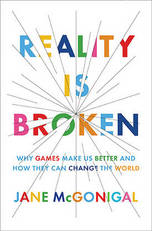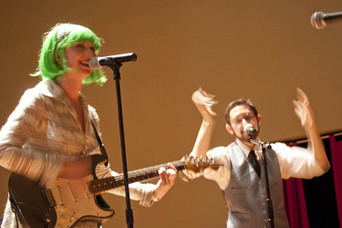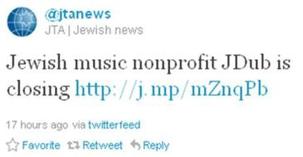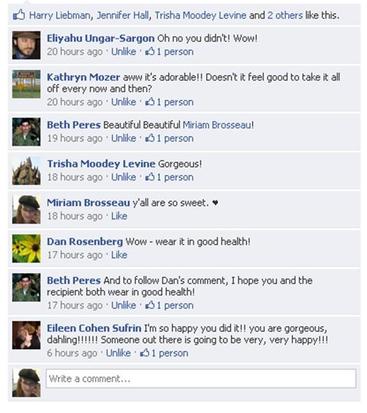The world lost a striking, unique talent with the recent passing of singer/songwriter (and notorious substance abuser) Amy Winehouse. Here are a few of the headlines that came out after her passing: Wake-up call? Really? If the death of Amy Winehouse is your wake-up call to the dangers of drugs, you are a mighty heavy sleeper. Amy Winehouse was not the first young, beautiful, talented celebrity to be taken by drug abuse. Hey everybody, remember Heath Ledger? Or (arguably, I guess) Michael Jackson? And what if we go back a few more years, from the mid-nineties to today? Bradley Nowell of Sublime. Steve Clark of Def Leppard. Kurt Cobain, Nirvana. Dee Dee Ramone. John Entwistle, The Who. DJ AM. And we could go even farther back to talk about Hendrix, Joplin, or Judy Garland. These are just a few select musicians. The list just gets longer and more depressing as you venture into visual art, comedy, theatre, dance... Here's a fun little list about just that from Wikipedia to perk up your day.Winehouse's death was not a wake-up call; it was deja vu. There was some dark irony to the drug-related death of the woman who wrote "Rehab" and "Back to Black," which may be why so many are so committed to turning this into a wake-up call. But irony and tragedy are cousins, and can all too often be found traveling together. I'm saddened by the loss of Amy Winehouse. And I wonder how we can remember her without falling back asleep. ( This is not what I would recommend. In case you were curious.) To end, I'll leave you with a couple of videos to compare.
Last weekend Alan and I shlepped ourselves and everything we own (well, it kinda seemed like it) to Goshen, NY, the site of the up-and-coming Yiddish Farm. Stereo Sinai had been invited to play on Sunday afternoon of their Golus Festival (there's a nice write-up about the festival with some pics here), and we decided to give it a shot for the whole weekend. "Golus" (or galut in Hebrew) means exile or, in some cases, Diaspora. It's the term used for the state of being into which the Jews were thrown after the destruction of the Second Temple in Jerusalem in 70 CE. It's usually kind of a nasty word, implying lowliness and loss. Forward-thinking Israelis don't typically use the word "galut" to describe Diaspora Jewry, favoring instead the word "t'futzot," or those of us who are spread out all over the place. (That's the technical definition, I swear.)
 And yes, we were in golus. Especially to a city-minded, non-camper such as myself. I was in golus from many, many things. Internet, for instance. Mattresses. Air conditioning. English. But we were also in golus in other ways. From denominations, for instance. The battles among Reform, Conservative, Orthodox, and other streams of Judaism are ongoing, bitter, and destructive (a friend wrote an interesting post about the end of this era that I recommend checking out). Here there was no such thing. Everyone from the most secular, strictly cultural Jew to a small crew of Satmar Hasidim gathered in our mutual love of all things Yiddish. Men and women, young and old...it was surprising and beautiful. We were in golus from a sense of hierarchy as well. I have to admit, I was skeptical as to how the festival would run. But everyone pitched in and made it happen. Leadership rotated, fluctuated, and rarely settled in one person. There were some really incredible moments throughout the weekend. Dancing with the Torah from one end of a field to the other. Marveling at the great masses of hay that descended from the sky, refuse from the farm next door which we all interpreted as manna from heaven. The moment we found out we were going to be in golus even from Golus because our camp site wasn't up to code for the number of people there (on Sunday morning we moved to another site for the music). Dancing with new friends. All these things and more. Don't get me wrong, I will not miss the mosquitoes and eating mostly the same thing every day and the oppressive day-heat and the bewildering night-cold. But I have walked away with a renewed appreciation for, and a new vision of, exile.
 Last night no less than four - count them, four - utility (manhole) covers blew up on my new street in Crown Heights. It caused quite the stir. The entire neighborhood came out and wandered around, chatting and laughing, basking in the glow of our respective mobile devices.
It turned into a big party. Alan and I finished off all the ice cream in the freezer, just in case.
While Alan and I were hunkered down outside the park that divides our street, I was busily checking Twitter and came across this tweet: "For financial reasons." It was at least as big a shock as my street exploding. But then again, manhole covers blow up all the time. And Jewish organizations are prone to closing when there's no money anywhere in sight for creative, forward-thinking projects that don't have anything (directly) to do with advocating for Israel or ending the "plague" of intermarriage. But manholes covers don't need to explode. It's a problem of maintenance. If we are more attentive to our streets and the magical grids below them that make our freezers keep ice cream cold and delicious, they won't cause the sparks that ignite the gases that make the manhole covers shoot into the sky. We need to invest in regular maintenance, not just emergency measures. The same is true of the Jewish world. JDub, and other innovative projects, needed maintenance (there's a great article on eJewish Philanthropy that illustrates this much better than I ever could - minus the flimsy manhole comparison). Jewish arts and culture are the magical wiring beneath the surface. They keep us whole, inspired. They simultaneously reflect and create our society, and they deserve our investment. I'm sure I will write on this again. In the wake of this boom, it will be interesting to see who from the neighborhood steps up, and how the landscape - the road - changes.
It should be clear at this point that my husband Alan and I are big, big nerds. (If you needed more proof, he's reading the Myst books right now and I...well, read my other blog posts.) So in that vein, we're watching the entire Star Trek: The Next Generation series from the beginning. Here's a way cheesy promo spot to get you excited for the rest of this post. There have been all kinds of articles talking about Star Trek technology, comparing it to the types of nifty gadgets we actually have today. And a competition has even been launched to help expediate the creation of a real-life tri-corder to diagnose disease. Pretty cool stuff. Even if you're not a nerd (I think). But there are some other interesting lessons we can learn from Star Trek, especially when it comes to social media. Here are a few: - "These are the voyages of the starship Enterprise..." Best. Elevator pitch. Ever. We should all be so eloquent, succinct, and powerful in pitching our own organizations and their missions. And we should all have Patrick Stewart do our voice-overs.
- High-ranking crew members are forever going on "away missions" to weird places that just so happen to be able to support human life. Watching this, I wonder - where is your Flip cam? Your iPhone? How are you not recording every moment of this? On the one hand, I'm right - they should really be documenting these "strange new worlds" they're seeking out. On the other hand, there's a nice lesson in here about human experience. Lose yourself in the documentation, and you miss the big picture. (Like the, dare I say it, John Mayer song, "3x5.")
- A similar lesson applies to the power of speech, and face-to-face contact. Crew members aren't (at least to my knowledge) constantly texting one another. They tap their chests and start a conversation, or they bring up a video screen and talk things through, complete with facial expression and body language. (On that note, there's a great TED talk about the power of video here.)
- "Captain's log..." I love blogging, but as a singer I also know there is something about recording your own voice - getting the tenor, the pauses, the changes in pitch, the mood... It's powerful. Hearing that back months, years, after completing a mission must be an intense exercise in reflection. And how much more could the person taking our position after we leave learn from not just our words, but the sound of them? If podcasts/vlogs were as neatly searchable as they are on the Enterprise (and they will be, one day), it would be amazing to see what more we could learn about ourselves.
It's interesting to think that Star Trek, for all its visions of the future, hardly addresses issues of social media. Video chat, sure, but not much else. The Federation is bureaucratic and hierarchical. The staff meets in a board room. Officers are divided by color. This is hardly the authentic, transparent, simple kind of organization that succeeds in social media spaces. Nonetheless, there are some interesting lessons to be gleaned that can help us make our own experiences in social media more meaningful and productive. Bottom line: Star Trek blends social technologies that best mimic true human interaction and learning into the work of the ship. Is there more to learn here? More to criticize? What would you add to this list?
I just donated my ponytail to Locks of Love. Here's the story in pictures:
(The new cut actually looked a little Justin Bieber-ish at first, but then the stylist and I talked about pixie bangs and all was well with the world.)
I don't know how I found out about Locks of Love, or really why I've donated to it three times now. Mostly, to be honest, it's an excuse to get a funky haircut every once in a while. But at work today - amidst the squeals of "Oh my god! You cut your hair!" - a coworker brought it home for me...
"A friend of mine had cancer, and went through the whole thing...treatments, hair loss... Those donations really get used."
And when I uploaded the "after" picture to Facebook, I got these comments:
My friends (and wonderful, exclamation-point-happy mother-in-law) really tapped into it: I'm wearing new hair, and someone else will be, too. We should both wear it in good health.
In Israel, when someone gets new clothes, or a new car, or a haircut, you say "titchadesh" for a man or "titchadshi" for a woman. It means "may this new thing bring you renewal." I really like that. And I think it's especially appropriate for something like Locks of Love. So go in love, locks! Time for something new.
The Tower of Babel gets a bad rap. Here's an offensive-ish video illustrating just that fact...
Humanity gangs up, decides to take over heaven, building this massive structure together, which is eventually thwarted by the divine beings who get freaked out about humanity's power. Blecch. As Social Media Coalitions Manager at the Jewish Education Project (wow, segue), I've been thinking a lot about collaboration and what it means to build something together. Whereas a model like, say, building the mishkan is a pleasant reference, the Tower of Babel invokes a sense of caution, even dread. Don't dream too big! it warns. I believe, though, that there is another message we can glean from this text; one that doesn't stop you in your tracks and shout at you that you're not a god. Quite the contrary. In "Reality is Broken" (seriously, just read it), my new hero Jane McGonigal talks about the feeling we get when we're immersed in what she calls "epic environments." "An epic environment," she writes, "is a space that, by virtue of its extreme scale, provokes a profound sense of awe and wonder." Built epic environments, those we know have been crafted by human hands, inspire in us a particular sense of awe - "it makes us feel capable of much bigger things, together." The Grand Canyon is a good example of a natural epic environment, while the Great Wall of China is a built one. McGonigal talks about the first epic environments, places constructed thousands of years ago for, it seems, the express purpose of inspiring a sense of awe. The Gobekli Tepe, for instance, which predated Stonehenge by thousands of years, was among humanity's first 'cathedral' on a hill. One would think that these structures were the products of advanced societies, cultures that had learned to cooperate on a huge scales. Surprisingly, though, evidence suggests that the opposite may be true. "The stone cathedrals...actually inspired and enabled human society to become dramatically more cooperative, completely reinventing civilization as it once existed," McGonigal explains. Whoa. Some mind-flip, huh? Now let's return to the infamous Tower of Babel, viewing it with this new information in mind. No wait, let's back up a bit. Let's start with Noah and the Ark. Arguably the Ark was an epic environment, yeah? Massive in scale, housing two of every species on the entire planet, some kind of weird sewage system... It must have inspired the sense of awe we're talking about. But the Ark was a one-man kind of deal. The rabbis often fault Noah (who was "righteous in his time"... but probably wouldn't have cut it were he stacked up next to, say, Abraham) for not involving others. Unlike Abraham, who argued passionately on behalf of a couple of sinful cities, Noah got the marching orders and set to work. No questions asked. No one else involved. The Tower of Babel, on the other hand, was a grand-scale collaborative effort. All of humanty gathers to achieve one goal - to build an epic environment. So epic, in fact, that it would reach to the heavens. The divine beings are threatened by this move, and resolve to "confound their speech." Humanity is then spread over the entirety of the earth, effectively preventing a breech of the upper world. The text portrays this scene pretty negatively. Man's hubris, divine intervention, and a punishment that throws us all that much farther out of the Garden of Eden. But what if we read it another way? What if we looked at the positive results of this story? Building the Tower of Babel taught us to be cooperative. This project forced humanity to test the limits of its power. It certainly invoked a sense of awe in the builders and onlookers - the kind of awe McGonigal writes about. The kind that makes bigger things seem doable. And perhaps the divine punishment is not that at all. Being scattered, developing new languages... These are new adventures, wider horizons, opportunities to build complex societies in vastly different territories. And none of this would have been possible if we hadn't built the Tower in the first place. So maybe this biblical tale of the second built epic environment wasn't so bad as it seems. If you buy into my optimistic reading at all, then, dear readers, we have a new task at hand. The divine beings thought they were preventing further collaboration by spreading us out and tangling our tongues. How about we prove them wrong, eh?
...brought to you by the good people at Stereo Sinai...
Chocolate. Roller coasters. Pictures of cats on the internet. What makes you say "Oi!"?* Stereo Sinai is recording a new song, and we need your vOIce!
Send us a sound file of your best "Oi!" and be a biblegum pop star! The top ten most energetic, enthusiastic, and hard-core oi's will be featured in the song. Those ten Thumpers will also receive a free mp3 of the song when it is released, and a listing in the album liner notes. Think of it, Thumpers: biblegum pop immortality.Send your sound file (or any questions) to: [email protected].
OR call the Stereo Sinai "Oi!" Hotline and leave your name and oi in the message: (347) 770-6527Entries due by noon on June 17th. Need some inspiration? Check out these oi's: No Doubt "Oi to the World": http://youtu.be/hoL1Uxwk6vcRobbie Williams Aussie/Oi: http://youtu.be/oFErZurWGv8Dropkick Murphys "Oi Oi Oi": http://youtu.be/04Zbhk1c7nM*Oi is the opposite of the Yiddish Oy. Where oy means "oh no," oi is more like "oh yeah"!
I've been running through a pretty significant library of extra-curricular reading lately (thank you, Kindle app). It's been awesome. I read "Here Comes Everybody," then "Groundswell," both of which were solid reading for any social media buff. Then I moved on to "The Networked Nonprofit," which I am declaring to be compulsory reading for anyone who does anything in the world and wants to do it smarter, simpler, and more effectively. I dug "The Starfish and the Spider" for the concept, not so much for the hands-on. (It's actually a good companion piece to "Networked Nonprofit.") And now I've caught the gaming bug - I'm just getting into "Reality is Broken." And it's awesome.  Jane McGonigal is quickly becoming a new hero of mine. She's smart, and talented, and often funny. She's simultaneously grounded and hopelessly optimistic. She uses the word "gamefulness." She's so cool!
McGonigal is out there saying that there are things that are broken in the world, and maybe the lessons we learn from games can help us fix them. Maybe making our lives more game-like will add meaning to our lives. (Just read the book.)
I don't care if she's "right." She makes me want to believe.
Games and art make life worth living. Ok, I can buy that; game on.
(Insert obligatory, half-hearted "sorry I haven't blogged recently" comment here. Okay, moving on.) This past Monday and Tuesday I was pleased to be attending the Jewish Outreach Institute's Judaism 2030 conference. It was mostly a fantastic event, full of great networking and thoughtful, exciting presentations. I was tweeting madly the whole time. After getting back, my head buzzing with big ideas and the thrill of new connections, I decided, what the heck, I'll check my Klout score. Turns out two days of non-stop Twitter chatter had bumped me up six points. Whoa, seriously? Klout is a site that measures a person's influence online. They've developed an impressive array of graphs, charts, and other visual paraphernalia to help you break down and analyze your influence, and compare it with others'. Once you've seen your score, you also have the option of sharing it through your social networks. I, apparently, am "effertively using social media to influence my network across a variety of topics." I am a Networker. It made me proud to hear that - this ridiculous bit of digital validation was kinda cool. Being someone who actively tries to connect cool people, it was nice to see the interwebs recognize and reward those efforts with a tidy little score.
Humans love to measure things. We love to compare. When we have those numbers, those qualifiers, it helps us make sense of the world. We can put things in categories and extract them as needed. But do these measurements really mean anything?
But networking is not about numbers. It's about people, about connections, about making meaning and building enduring, mutually beneficial relationships.
So, what's the relationship between the numbers and the people behind them? Do you tout your Klout? To what end?
 Last night I went out with a college friend of mine whom I hadn't seen in way too long (entirely my fault, but that's another story). She's currently working in a Teach-for-America-style program, stationed in a class of emotionally troubled kids in Harlem. It's challenging, she admits, but rewarding, and it has taught her a lot about empathy...and about authenticity. These kids live in the moment, and if in that moment you're not being real, they'll see right through it and tear you to shreds. It got me thinking. Really, what does it mean to be authentic? Social media is the same way. The first rule of online interactions is that you've got to be real. The minute you become nothing more than a brand, or a mouthpiece, or spam, you turn people off. How, then, do you negotiate the space between revealing nothing and revealing too much? With Stereo Sinai, I often wear these funky colored wigs in concert. On the one hand, it's my little twist on the already somewhat bizarre tradition of Orthodox women wearing sheitels to cover one's hair. On the other hand, it's kind of a commentary on real vs. fake. Stereo Sinai performs pop - the most synthetic music around. We sing in biblical Hebrew, a language rich with meaning. Putting them together, I think, pushes the boundaries and forces questions and to what's really real, what's authentic. Being real, being true to ourselves and others, is something we all are (or should be) struggling with. It's an ongoing process, and not one with a definable product. What kinds of questions do you ask about authenticity? How do you keep it real?
|










 RSS Feed
RSS Feed